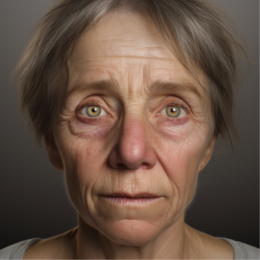Stages of Dementia & Anger: A Caregiver’s Guide

Dementia and Its Stages
Definition and Classification of Dementia
Dementia is not just a single disease but a collection of symptoms affecting memory, thinking, and social abilities. It includes various types, such as Alzheimer’s, vascular dementia, and Lewy body dementia, each with its unique challenges.
Stages of Dementia
Dementia progresses through stages, from Mild to Severe. Understanding these stages is crucial as each comes with its symptoms and challenges, affecting both the patient and their caregivers.
Overview of Common Symptoms in Each Stage
In the Mild stage, forgetfulness and confusion are everyday but often dismissed as age-related changes. As the disease progresses to the Moderate and Severe stages, the symptoms become more debilitating, affecting daily life and requiring increased levels of care.
Fact and Statistics:
Alzheimer’s disease accounts for 60-80% of dementia cases. Knowing the stages can help you anticipate and manage symptoms more effectively.
The Behavioral Symptoms of Dementia
Behavioral symptoms can include a range of issues from depression and anxiety to more disruptive behaviors like dementia and anger outbursts. These symptoms can be particularly challenging for caregivers, requiring specialized training and patience.
Fact and Statistics:
Nearly 90% of people with dementia experience some form of behavioral change, making it a crucial aspect of dementia care.

Anger in Dementia: Prevalence and Characteristics
Prevalence of Anger in Dementia Patients
Anger is a common symptom of dementia, especially in the moderate to severe stages. According to Medical News Today, as many as 20% of patients in the mild stage display signs of anger.
How Anger Manifests in Individuals With Dementia
Anger in dementia can manifest in various ways, from verbal outbursts to physical aggression. It’s not just the loudness of the anger that’s concerning; it’s also the suddenness and unpredictability.
Impact of Anger on Caregivers and Family Members
The emotional toll of dealing with a loved one’s anger can be high, often leading to caregiver burnout. It’s a double-edged sword, affecting both the patient and their family.
Fact and Statistics:
Did you know that dementia affects nearly 50 million people worldwide?
Quick Poll
Identifying Anger in Dementia
Challenges in Recognizing Anger
Recognizing anger in dementia patients can be like walking through a minefield. The symptoms often overlap with other behavioral issues, making it challenging to identify the root cause.
Key Signs and Symptoms
Sudden mood swings and emotional outbursts can serve as red flags. These signs often precede more intense episodes of anger, providing a window for early intervention.
Fact and Statistics:
Studies show that caregivers often misinterpret the signs of anger, mistaking them for general irritability or discomfort.
Which Stage of Dementia Is Anger Most Common?
The Correlation Between Dementia Stage and Anger
Anger is most commonly observed in the moderate stages of dementia. However, it’s essential to remember that each patient is unique, and not all will experience anger.
Mild-Stage Dementia and Early Signs of Anger
While not common, irritability and mood swings in the early stages can serve as precursors to more intense anger episodes later on.
Moderately Advanced Dementia and Increased Frequency of Anger
In the moderate stages, the frequency and intensity of anger often escalate. This can be a challenging period for caregivers, requiring additional support and resources.
Fact and Statistics:
Anger and aggression are most commonly observed in the middle stages of dementia, affecting both the patient and the caregiver’s quality of life.
Contributing Factors to Anger in Dementia
Biological Factors
Neurological changes in the brain can contribute to emotional volatility. These changes can exacerbate symptoms like anger, making management more challenging.
Environmental Triggers
Factors like noise or a change in routine can trigger anger episodes. Being aware of these triggers can help in preventive management.
Unmet Physical or Emotional Needs
Often, anger arises from unmet needs like hunger or physical discomfort. Addressing these basic needs can sometimes prevent anger episodes.
Medication Side Effects
Some medications can worsen behavioral symptoms. Always consult a healthcare provider for a comprehensive treatment plan.
Fact and Statistics:
Environmental factors like noise can increase the likelihood of anger episodes by up to 30%.
Coping and Managing Anger in Dementia
Person-centered Care
Tailoring care to the individual’s unique needs and triggers can significantly improve the quality of life for both the patient and caregiver.
Non-pharmacological Interventions
Techniques like redirection and deep breathing can help manage episodes of anger. These techniques are often preferred over medication, which can have side effects.
Medications
In some cases, medication may be necessary. However, this should be a last resort and always under medical supervision.
Fact and Statistics:
Non-pharmacological interventions like redirection have a success rate of up to 70% in managing anger symptoms.
Conclusion
Understanding which dementia anger stage is most common can equip caregivers and family members with the necessary tools. Being informed is not only empowering but also the first step toward fostering a more understanding and compassionate caregiving environment.
PLEASE SHARE YOUR EXPERIENCE AND THE COMMENTS BELOW SO WE CAN HELP EACH OTHER WITH THE KNOWLEDGE YOU HAVE GAINED.
References
- Medical News Today. What to know about dementia and anger at loved ones. https://www.medicalnewstoday.com/articles/dementia-and-anger-at-loved-ones
- Alzheimer’s Association. Aggression and Anger. https://www.alz.org/help-support/caregiving/stages-behaviors/agression-anger
- ‘The DAWN Method.Dementia’ ‘Anger Stage’. https://thedawnmethod.com/dementia-anger-stage/‘The DAWN Method. Dementia ‘Anger Stage’. https://thedawnmethod.com/dementia-anger-stage/
- Aging Care. Dementia and Anger: Causes, Tips, and Prevention. https://www.agingcare.com/articles/causes-of-alzheimers-anger-143103.htm





